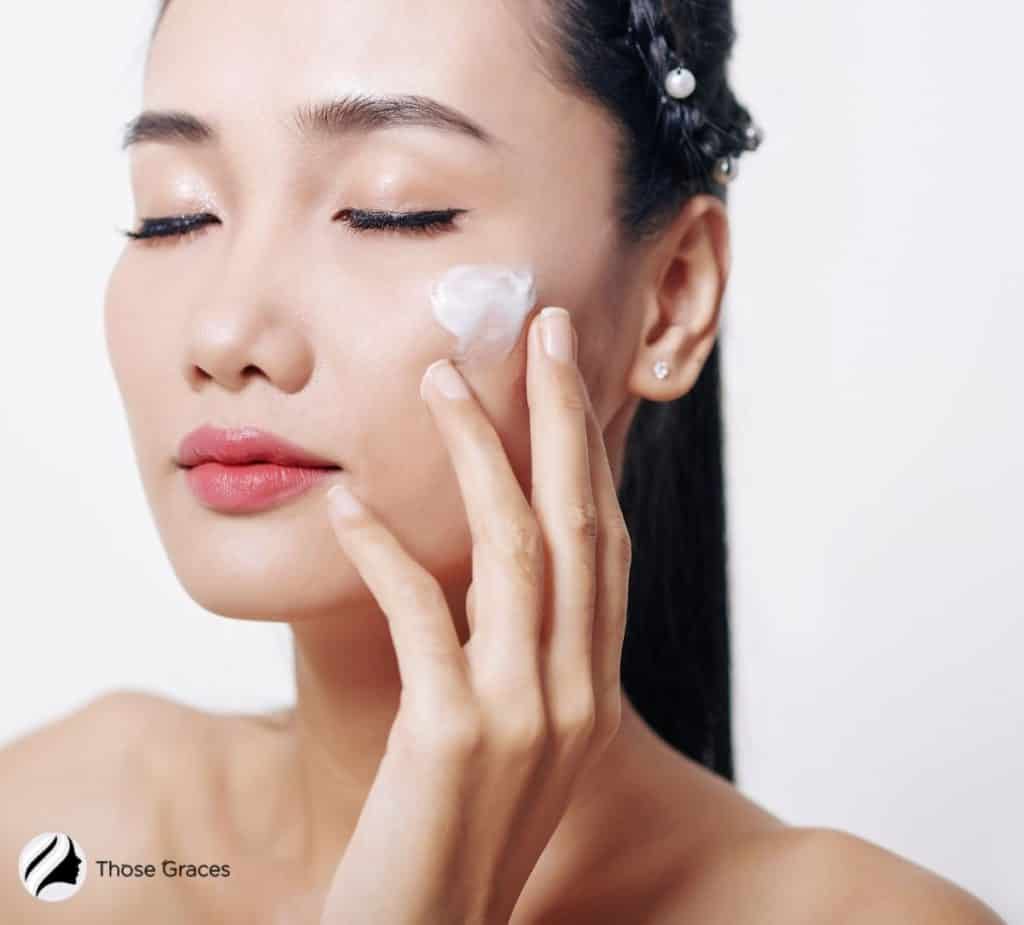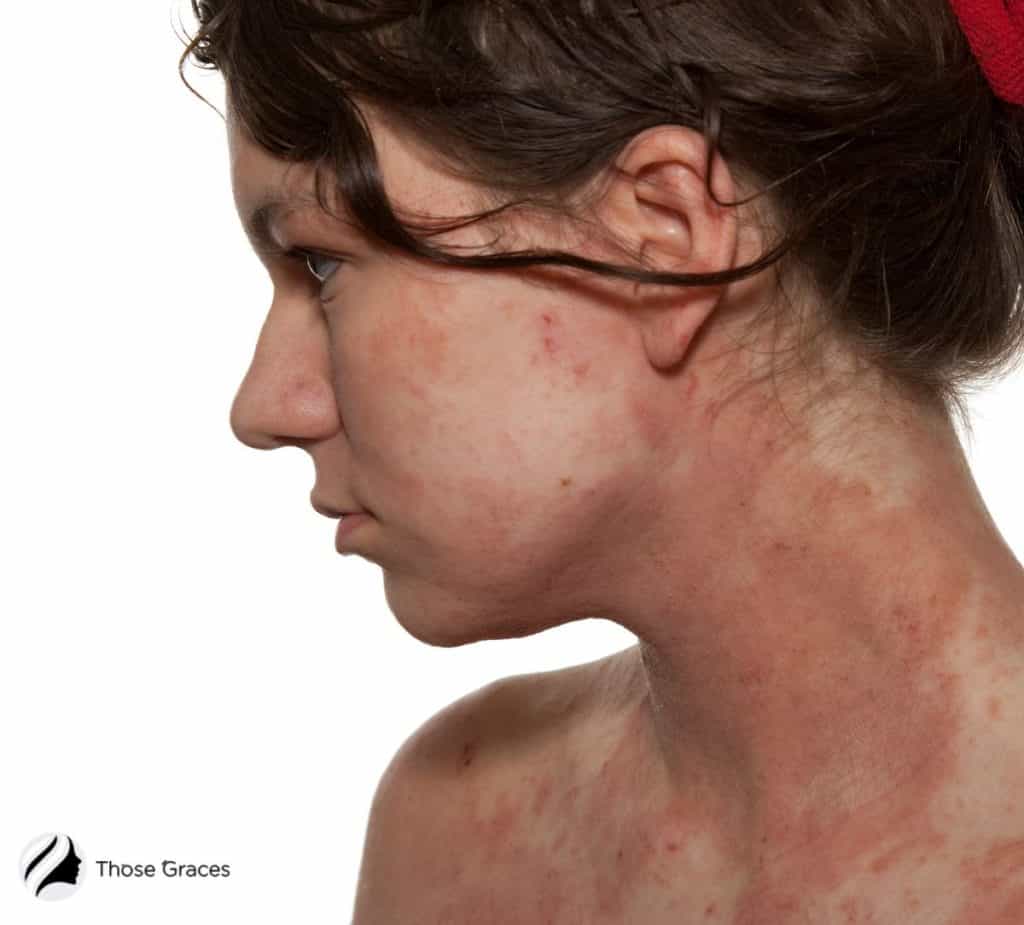Worried about dealing with severe eczema as a woman? Look no further!
Studies such as the National Institute of Allergy and Infectious Diseases explain that women with eczema are uniquely vulnerable to certain skin infections – and as a beauty expert, I’ve seen this a lot [1].
In this article, you’ll learn about the triggers, the connection between hormones and flare-ups, and effective treatments tailored for women.
Dive in for the proper skincare routine and bid farewell to eczema ASAP!
Key Takeaways
- Hormonal fluctuations in women can significantly influence eczema flare-ups.
- Natural and medical treatments are available, tailored to women’s unique needs.
- Awareness and early intervention can minimize eczema’s impact during significant life stages.
Severe Eczema: 12 Essential Care Tips for Women
Severe eczema management is as much about daily lifestyle choices—from diet to products—as it is about medical treatments. But by taking strategic steps, you can curb eczema’s hold on your life!
Let’s dive deeper into these 12 strategic tips that can significantly alter your experience with severe eczema.
Tip #1: Opt For A Healthy Diet
The diet’s influence on our skin’s health is often underestimated.

What we consume can directly reflect on our skin. Some people with eczema find significant relief by merely adjusting their diet – by reducing or entirely cutting out potential triggers such as dairy or gluten.
Nonetheless, the relationship between diet and eczema isn’t universal. For some, keeping a food diary to track and correlate food intake with flare-ups can be valuable.
But, before embarking on any major dietary shifts, it’s imperative to consult with a healthcare professional.
Tip #2 Go with a Moisturizing Routine
If you have eczema, a solid moisturizing routine is not just beneficial; it’s indispensable.

The market is flooded with products, but those with sensitive, eczema-prone skin should turn towards more natural, chemically-free products.
Ceramides, for instance, are noteworthy ingredients known to reinforce the skin’s natural barrier. Ensuring the skin remains hydrated involves more than a once-a-day application.
It’s especially crucial to moisturize after bathing, but the essence lies in choosing products crafted for eczema-prone skin.
Tip #3 Limit Irritants
Our daily environment is peppered with potential irritants. From the laundry detergent we use to the perfume we spritz, choices matter.
Being proactive and discerning about our products can stave off unnecessary flare-ups.
Additionally, our wardrobe choices play a part. Soft, breathable fabrics like cotton are favorable, while materials such as wool or polyester, known as irritants, should be avoided.
Being conscious and deliberate in these choices can make a world of difference.
Tip #4: Incorporate a Skin Care Routine
Committing to a daily skincare routine can be transformative. This regimen should ideally begin with a gentle cleansing process, followed by an eczema-tailored moisturizing routine.

While weekly exfoliation can benefit by removing dead skin cells, it’s vital to be gentle and avoid aggressive techniques that could worsen the condition.
The balance is paramount here; overwashing or over-exfoliating can strip the skin of its natural oils, enhancing dryness.
Tip #5: Learn about Medication & Topical Treatments
When severe eczema doesn’t respond to typical over-the-counter treatments, stronger interventions might be necessary.
Like prescription medications, topical treatments (e.g., corticosteroid creams) have proven effective in managing inflammation and controlling persistent flare-ups.
Yet, while they can bring relief, it’s essential to be aware of potential side effects.
As always, should you have any concerns, check with your dermatologist before commencing any potent treatment. After all, they are the pros!
If you’re sold on buying some, check out reputable sources to get your medications for eczema & dermatitis conditions.
I’d recommend a trustworthy online pharmacy like the Independent Pharmacy [3].
Tip #6: Consider Natural Alternatives
Holistic health solutions are gaining traction, and with good reason. Natural remedies such as coconut oil, aloe vera, and calming oatmeal baths offer some respite for those grappling with eczema.
However, it’s worth noting that other methods, like plastic surgery, have also been observed to boost confidence in certain individuals.
How Plastic Surgery Helps with Confidence is a topic that has garnered attention, as it can offer both aesthetic and emotional benefits for those who opt for it.
They are renowned for their soothing properties, which can alleviate inflammation and provide much-needed moisture.
With this in mind, it’s paramount to remember that reactions to natural products can vary. Before diving in, always perform a patch test to ensure compatibility.
Tip #7: Limit Stress
The intricate link between our emotional well-being and physical health cannot be overstated.
Psychological stressors, including anxiety and sleep deprivation, have been identified as exacerbating factors for eczema flare-ups.
By incorporating stress-reducing practices, such as meditation, deep breathing exercises, or simple nature walks, one can create a positive loop of reduced stress and fewer flare-ups.

Tip #7: Detect Infections Early
Eczema-compromised skin is, unfortunately, more prone to bacterial, viral, and fungal infections. Early detection and timely intervention are essential.
Tell-tale signs like increased redness, pus, or sudden fever should be promptly addressed.
Good hygiene practices and balanced skin cleansing are primary defense lines against potential infections.
At any sign of complication, seeking medical advice should be a priority.
Tip #8: Seek Professional Help
There’s no shame in seeking professional intervention.

While many manage their eczema independently, there are instances where a specialist’s insights can prove invaluable.
A dermatologist can offer bespoke advice and treatments tailored to individual needs.
In fact, professional consultation is a prudent next step if over-the-counter treatments are ineffective or if flare-ups escalate suddenly.
Tip #9: Limit Sun Exposure
While moderate sunlight might benefit some by reducing inflammation, overexposure can aggravate the skin, leading to flare-ups.
Again, certain eczema medications can heighten sensitivity to sunlight. If you’re venturing outdoors, always use sun protection and seek shade when necessary.

Tip #10: Understand the Role of Allergens
Environmental allergens such as pollen, dust mites, and pet dander often play a hidden role in exacerbating eczema symptoms.
It’s vital to be aware of common allergens and, where possible, limit exposure.
Investing in allergen-proof beddings, regular cleaning, and air purifiers can significantly affect indoor environments.
Tip #11: Use Support Systems
Living with severe eczema can sometimes be an isolating experience. Finding and connecting with support groups, both online and offline, can be therapeutic.
Sharing experiences, exchanging tips, and simply knowing you’re not alone can be mentally and emotionally uplifting.
Tip #12: Explore Advanced Therapies
As science progresses, new treatments for severe eczema emerge. From biologics to light therapy, many advanced interventions are available today.
While not everyone might need them, being aware of these options and discussing them with a dermatologist can open doors to innovative solutions.
Eczema, often perceived as a mere skin irritation, can profoundly affect a person’s quality of life when it intensifies.
Especially for women, who often find themselves navigating the dual pressures of maintaining skin health while meeting societal beauty standards, grappling with severe eczema can be physically and emotionally challenging.
For a brief wrap-up, check out this video from Dr. Jennifer Stephens on eczema:
After discussing some tips on dealing with eczema, you might ask yourself what science says about eczema. Why do you get it? Let’s find out…
Eczema In A Nutshell | Overview
Eczema, scientifically known as atopic dermatitis, presents as dry, itchy, and inflamed patches of skin [2].
In fact, studies show that nearly 1 in 5 people will experience eczema during their lives – so this is not a condition to take lightly [2]!
Though initially harmless, these signs represent a deeper underlying issue…
As the condition worsens, these irritating symptoms can become more prominent, leading to not just physical discomfort but also impacting a person’s self-worth and emotional state.
But how do eczema victims describe the condition?
Eczema can be likened to a “seesaw,” with moments of relief followed by bouts of intense discomfort.
Many things can set off eczema flare-ups, from stress and the food we eat to our surrounding environment.
So, getting eczema means more than spotting its signs – it’s about knowing what can trigger it and how it can affect our general health.
The more we know and the better we handle it, the easier it becomes to help those with eczema find some comfort and heal.
After all, informed knowledge and proactive management are the keys to mitigating its impact and guiding those affected toward relief and recovery.
NEXT: Get ready to learn about eczema’s triggers and how to build awareness…
Eczema Triggers & Ways To Prevent Them
Now that you know how to go toe-to-toe with eczema, you may wonder, “What are the triggers?”

Indeed, recognizing what sets off an eczema flare-up is half the battle…
Trigger #1: Genetics
The underlying causes of eczema span a broad spectrum. Genetics lays the foundation for many, yet the external environment cannot be ignored.
Trigger #2: Environment
Our surroundings are filled with potential triggers. This can range from plant allergens and pet dander to irritants in household products.
Even fluctuating weather conditions can exacerbate eczema for some.
Trigger #3: Emotional Stress
Other triggers can be emotional states (depression, anxiety), which can differ greatly between people.
While common culprits include certain foods, synthetic fabrics, or stress, some might find unique triggers like specific body care products or hormonal changes.
While the physical manifestations of eczema are evident, the psychological toll often remains unspoken [4].
The relentless itch, the unpredictability of flare-ups, and the societal emphasis on flawless skin can contribute to feelings of anxiety, depression, or self-consciousness.
Possible Solution? Keep a journal
Keeping a detailed journal can be instrumental in mapping out and identifying these individual triggers.
In addition, by being attuned to your body’s signals and patterns, you can pre-emptively manage or even prevent certain flare-ups, offering you more control over your condition.
Mental Support
It’s crucial to acknowledge these emotional challenges. Seeking professional mental health support or therapy can be invaluable in navigating these feelings.
For more common queries, let’s scroll down and discover more…
FAQs
What triggers eczema flare-ups in women?
Are there natural remedies for eczema in women?
How does pregnancy affect eczema?
Conclusion
What Every Woman Needs To Know About Dealing With Severe Eczema is that she can control it with patience, practice, and the right information.
Tackling severe eczema is undoubtedly a journey requiring patience, resilience, and continual learning.
Yet, with the right resources and approaches, it’s a journey that can be navigated with poise and optimism.
Understanding and managing severe eczema is about more than just skin health; it’s about embracing oneself wholly, acknowledging vulnerabilities, and seeking holistic well-being.
For every woman grappling with this condition, remember that while eczema might be a part of your story, it doesn’t define your beauty, strength, or spirit.
Armed with knowledge and understanding, you can shine through any challenge.
Resources
1. Eczema (Atopic Dermatitis) | NIH: National Institute of Allergy and Infectious Diseases [Internet]. Nih.gov. 2017. Available from: https://www.niaid.nih.gov/diseases-conditions/eczema-atopic-dermatitis
2. Foundation BS. Eczema – British Skin Foundation [Internet]. knowyourskin.britishskinfoundation.org.uk. Available from: https://knowyourskin.britishskinfoundation.org.uk/condition/eczema/
3. Buy Eczema & Dermatitis Cream & Ointment Online – UK Pharmacy [Internet]. The Independent Pharmacy. 2023 [cited 2023 Aug 23]. Available from: https://www.theindependentpharmacy.co.uk/eczema-dermatitis
4. Mental Health Impact of Eczema [Internet]. Allergy UK | National Charity. 2022. Available from: https://www.allergyuk.org/resources/the-mental-health-impact-of-living-with-atopic-eczema/


